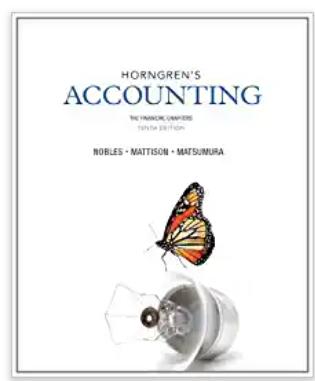Question
Please help me add a response to this post Hi Julio, you have mentioned something that's very important to point out, and this is when
Please help me add a response to this post
Hi Julio, you have mentioned something that's very important to point out, and this is when you are facing a decision-making process on a large purchase. When considering making a large purchase versus a small purchase, both relevant and irrelevant expenses can have an impact on the decision-making process. Let's explore how each type of expense can affect these decisions.
Relevant Expenses
Relevant expenses are directly related to the purchase being considered. These are the costs that directly influence the affordability and overall value of the item in question (Mohammad Mazibar Rahman & Islam, 2014). When making a large purchase, relevant expenses can be significant and may include factors such as:
- The actual cost of the item itself.
- Additional costs, such as taxes, shipping, or installation fees.
- Maintenance and upkeep expenses.
- Potential financing costs or interest rates if the purchase is made on credit.
When comparing relevant expenses between a large and a small purchase, the large purchase is likely to have higher absolute costs. This means that a larger upfront investment is required for the big-ticket item, which can impact immediate cash flow and available budget.
Irrelevant Expenses
Irrelevant expenses are costs that are not directly associated with the specific purchase decision at hand. These expenses may not have a direct impact on the financial aspects of the purchase itself but can still influence the overall financial well-being of the buyer (Bragg, 2023). Examples of irrelevant expenses include:
- Daily discretionary spending on non-essential items, such as dining out, entertainment, or impulse purchases.
- Subscription services or memberships that are not directly related to the purchase.
When considering irrelevant expenses, the cumulative effect of small daily expenses can add up over time and affect the buyer's overall financial situation. This, in turn, can influence their ability to afford either a large or a small purchase.
- Considering both relevant and irrelevant expenses, here are some key points to keep in mind when deciding between a large and a small purchase:
- Financial Stability: Making a large purchase requires careful consideration of your current financial stability and the ability to manage any relevant expenses associated with the purchase.
- Long-Term Planning: Consider the long-term impact of the purchase on your financial situation, including relevant expenses like maintenance costs and potential future expenses.
- Opportunity Cost: Assess the opportunity cost of making a large purchase - what other financial goals or investments might be forgone due to this purchase?
- Budgeting: Analyze your budget and cash flow to see how the purchase will fit in, taking into account both the relevant and irrelevant expenses.
Ultimately, the decision to make a large or small purchase should be based on a comprehensive understanding of your financial situation and goals. It's essential to be mindful of both relevant and irrelevant expenses to make an informed and responsible decision (Financial Planning Process | JamaPunji, 2018).
References
Mohammad Mazibar Rahman, & Islam, S. (2014, June).Appreciate the impact of relevant costing for decision making in Ready Made Garments (RMG) industry of...ResearchGate; unknown. https://www.researchgate.net/publication/323957107_Appreciate_the_impact_of_relevant_costing_for_decision_making_in_Ready_Made_Garments_RMG_industry_of_Bangladesh
Bragg, S. (2023, April 8).AccountingTools. AccountingTools. https://www.accountingtools.com/articles/what-is-an-irrelevant-cost.html
Financial Planning Process | JamaPunji. (2018). Jamapunji.pk. https://jamapunji.pk/financial-planning/planning-process
Step by Step Solution
There are 3 Steps involved in it
Step: 1

Get Instant Access to Expert-Tailored Solutions
See step-by-step solutions with expert insights and AI powered tools for academic success
Step: 2

Step: 3

Ace Your Homework with AI
Get the answers you need in no time with our AI-driven, step-by-step assistance
Get Started


